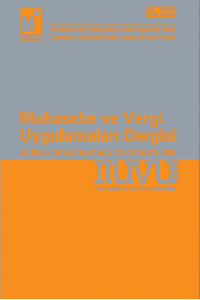Öz
Büyük ve
Orta Boy İşletmeler için Finansal Raporlama Standardı (BOBİ FRS), bağımsız
denetime tabi olup Türkiye Finansal Raporlama Standartlarını (TFRS) uygulamayan
şirketlerin (MSUGT’i
uygulayan işletmelerin) isteğe bağlı olarak uygulayacakları finansal raporlama çerçevesidir. BOBİ FRS seti, uluslararası muhasebe ve finansal raporlama
uygulamalarıyla ve AB düzenlemeleriyle uyumlu olarak Kamu Gözetimi
Muhasebe ve Denetim Standartları Kurumu (KGK) tarafından hazırlanarak
29/07/2017 tarihli Resmi Gazete’de yayımlanarak yürürlüğe girmiştir. Bu tebliğe
göre; şirketler 01/01/2018 tarihi ve sonrasında başlayan hesap dönemlerinde
gerçeğe uygun, ihtiyaca uygun ve karşılaştırılabilir bilgi sağlamak amacıyla
münferit ve konsolide finansal tablolarını BOBİ FRS’ye göre hazırlamaları
gerekmektedir.
Yapılan
bu çalışmada, ilk olarak BOBİ FRS’yi uygulayacak olan şirketlere ilişkin genel
bir değerlendirme yapılmıştır. Ardından, şirketlerin bilançolarında önemli bir
paya sahip olan maddi duran varlıkların (MDV) BOBİ FRS’ye göre muhasebeleştirme
esasları ele alınmıştır. Bu kapsamda çalışmanın amacı, BOBİ FRS açısından maddi
duran varlıklara ilişkin ilk kayda alınma, muhasebeleştirilme ve bu varlıklarla
ilgili amortisman ve değer düşüklüğü konularını ayrıntılı
şekilde açıklamaktır.
Anahtar Kelimeler
Kaynakça
- 4. ICAFR'17
Öz
Groups formed by individuals born at about the same
time and possessing common characteristics are called generations. Generations
are basically categorized as traditionalists, baby boomers, generation X, Y and
Z. Individuals born between the years 1980-2000 fall into the category of
generation Y and they have been the subject of research in numerous recent
studies. The main elements that play a role in the effectiveness of the
educational process are the characteristics and the interest levels of the
students. The developments experienced at the social level through technology also
change the habits of learning along with the characteristics of the
individuals. The structure of accounting science is basically composed of body
of rules and like other fields, the science of accounting is affected from this
change at the instructor-learner level. When technology use, habits, mobile and
mobility perceptions of generation Y are considered, there are likely to be
some special cases between accounting education and this generation.
In this study, the concept of generation, classification of generations and
differentiating characteristics of generation Y were examined and the structure
of accounting education and the methods that can be followed in accounting
education were mentioned in the context of generation Y. Then, the characteristics of the
undergraduates of generation Y at the Management Faculty of Alanya
Alaaddin Keykubat University together with their perceptions about the
accounting course, thoughts about the teaching techniques and methods related
to accounting education were observed by survey method. Finally, suggestions
were presented about how generation Y students can be provided with accounting
education more effectively. The findings obtained show that it is a requirement
for particularly, universities and educational community and also all
stakeholders including politicians and local governments to consider the
characteristics of generations that they are in touch with.
Anahtar Kelimeler
Generation Y Accounting Education Teaching Techniques and Methods
Kaynakça
- 4. ICAFR'17
Ayrıntılar
| Birincil Dil | Türkçe |
|---|---|
| Bölüm | Sayı |
| Yazarlar | |
| Yayımlanma Tarihi | 20 Nisan 2018 |
| Gönderilme Tarihi | 20 Eylül 2017 |
| Kabul Tarihi | 11 Mart 2018 |
| Yayımlandığı Sayı | Yıl 2018 10. Yıl Özel Sayısı |
Cited By
E - MUHASEBENİN MUHASEBE EĞİTİMİNDEKİ YERİ
Uluslararası Batı Karadeniz Sosyal ve Beşeri Bilimler Dergisi
https://doi.org/10.46452/baksoder.1187314
Determining the Attitudes Affecting Accounting Education of Department of Accounting Students
Erzincan Üniversitesi Sosyal Bilimler Enstitüsü Dergisi
Ulukan BÜYÜKARIKAN
https://doi.org/10.46790/erzisosbil.931015
ÖĞRENCİLERİN MUHASEBE EĞİTİMİNE BAKIŞ AÇILARI VE MUHASEBE EĞİTİMİNDE ÖLÇME VE DEĞERLENDİRME
Ağrı İbrahim Çeçen Üniversitesi Sosyal Bilimler Enstitüsü Dergisi
Utku Şendurur
https://doi.org/10.31463/aicusbed.567122
MESLEK YÜKSEKOKULUNDA ALINAN MUHASEBE EĞİTİMİNİN MUHASEBE MESLEĞİNE KATKISI: KUYUCAK MESLEK YÜKSEKOKULU MEZUNLARI ÖRNEĞİ
Muhasebe ve Vergi Uygulamaları Dergisi
D. Ali KIZILYALÇIN
https://doi.org/10.29067/muvu.482756

Bu eser Creative Commons Atıf-GayriTicari 4.0 Uluslararası Lisansı ile lisanslanmıştır.
Bu lisans, üçüncü kişilerin ticari olmayan amaçla eserinizden yararlanmasına, farklı bir sürüm oluşturmasına, geliştirmesine ya da eserinizin üzerine inşa ederek kendi eserlerini oluşturmasına izin verir. Ancak üçüncü kişilerin bu eserleri gayri-ticari olmak zorundadır ve üçüncü kişiler Dergimizde yayımlanan makalelerin yazarlarına atıfta bulunmak zorundadır.
Makale göndermek için https://dergipark.org.tr/tr/journal/591/submission/step/manuscript/new


